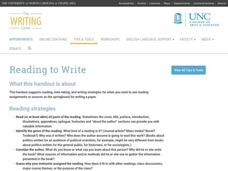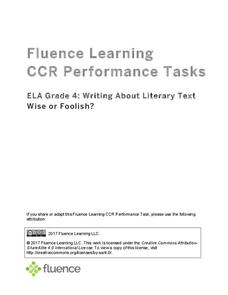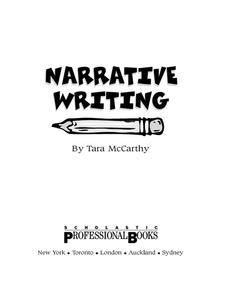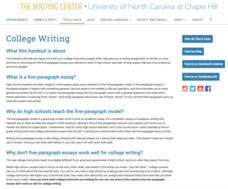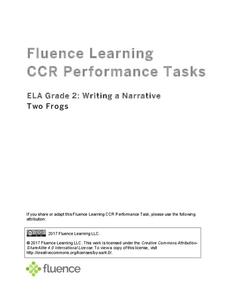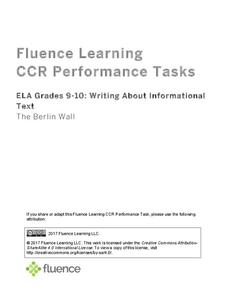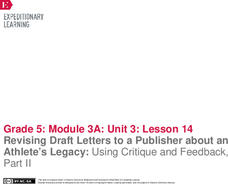University of North Carolina
Reading to Write
Silly journal and essay prompts may be fun to write, but they don't model the kind of writing needed for college papers and standardized tests. The 15th part in a series of 24 covers the concept of reading to write—during and after...
Curriculum Corner
“I Can” Common Core! 3rd Grade Writing
Present third grade writers with clear learning objectives using this Common Core checklist. By phrasing each standard as I can statements, this document serves as an excellent resource for helping children further develop their writing...
Fluence Learning
Writing About Literary Text: Wise or Foolish?
A three-part assessment promotes reading comprehension skills. Class members read literary texts and take notes to discuss their findings, answer comprehension questions, write summaries, and complete charts.
Bermingham City Schools
Opinion Writing
It's no secret that children can be very opinionated, but rather than fight against this natural tendency, embrace it with this primary grade writing project. After a shared reading of a children's book about persuasion, young learners...
Scholastic
Narrative Writing
If you're looking to start a unit based around narrative writing, make sure to consider this resource while you're planning. This book covers five topics: writing personal narratives, writing narratives about others, writing narratives...
University of North Carolina
College Writing
No matter how difficult high school writing may seem, college writing presents challenges of its own. The fourth in a series of 24 handouts from The Writing Center at UNC breaks down the expectations for college writing. Scholars learn...
Poetry4kids
How to Write a Repetition Poem
A repetition poem is the focus of a lesson that challenges scholars to compose an original piece. To add meaning to their poem, authors choose words to repeat at the start of most lines.
Curated OER
Nonfiction Genre Mini-Unit: Persuasive Writing
Should primary graders have their own computers? Should animals be kept in captivity? Young writers learn how to develop and support a claim in this short unit on persuasive writing.
Fluence Learning
Writing a Narrative: Two Frogs
Three options offer young writers the opportunity to read a short story, answer questions, and write a response. A handy language arts resource focuses on reading comprehension and analyziing the story's lesson: look before you leap.
Fluence Learning
Writing an Opinion: Student Council
A three-part assessment challenges scholars to write opinion essays covering the topic of the student council. After reading three passages, writers complete a chart, work with peers to complete a mini-research project, answer...
Fluence Learning
Writing About Informational Text The Berlin Wall
On June 26, 1963 President John F. Kennedy delivered his famous "Ich bin ein Berliner" speech close to the Berlin Wall at the Rudolph Wilde Platz. On June 12, 1987 President Ronald Reagan Delivered his famous "Mr. Gorbachev, tear down...
K12 Reader
Revise Your Writing
The importance of revising writing is the focus of a short reading comprehension instructional activity that asks readers to respond to a series of questions based on the article.
Trinity University
Explain Yourself: An Expository Writing Unit for High School
Introduce expository writing with a unit that asks writers to craft an essay to explain a belief, value, or priority that is important to them. Mini-lessons within the unit focus on crafting thesis statements and conclusions, selecting...
EngageNY
Revising Draft Letters to a Publisher about an Athlete’s Legacy: Using Critique and Feedback, Part II
Let's get opinionated. Scholars participate in a peer critique and revision process using a fun activity called a Four Corners strategy. After incorporating classmates' feedback, individuals share their final drafts of their opinion...
EngageNY
Revising Draft Letters to a Publisher about an Athlete’s Legacy: Critique and Feedback, Part I
Pick a corner, any corner! Pupils use the Four Corners strategy and Peer Critique protocol to assess one another's draft letters to a publisher about an athlete's legacy. Scholars then use peer feedback to revise their letters.
Core Knowledge Foundation
The Ancient Roman Civilization Tell It Again!™ Read-Aloud Anthology
A read-aloud anthology presents texts about the ancient Roman civilization. Lessons introduce readings, followed by a discussion and extension activities—word work, comprehension practice, and more. Writing focuses on opinion pieces, and...
Portland Public Schools
Opinion: Persuasive Essay Unit Introduction
Opinion, audience, purpose. Fourth graders are introduced to the three characteristics of persuasive writing in the third unit of a year-long writing program. The 98-page packet is complete with plans, model essays, graphic organizers,...
Southern Nevada Regional Professional Development Program
“Tell Me a Story”: Moving from Reading to Writing
Narrative essay writing is the focus of a series of exercises that model for learners how to not only read a narrative, but how to also examine the techniques fiction writers use to create a setting, develop their characters, represent...
EngageNY
Writing: Drafting Body Paragraphs and Revising for Language
Begin the drafting phase of the writing process with a lesson plan focused on logically writing three body paragraphs. Then, revise the writing to make it more formal after a teacher-directed mini-lesson plan. Each paragraph highlights...
EngageNY
Writing to Show, Not Tell: Dialogue, Sensory Words, and Strong Action Verbs
Consume, gobble, devour ... serving up strong verbs! Writers focus on using dialogue, strong action verbs, and sensory details in their writing. After analyzing a model narrative, they apply their learning to their own hero's journey...
Curated OER
The Six Traits of Writing
Targeted toward parents, the slides included here could be adapted for classroom use or shown at Back-to-School Night. The focus of the presentation is Six Trait Writing: ideas, organization, voice, word choice, sentence fluency, and...
Ohio Literacy Resource Center
Writing a Well-Structured Paragraph
Practice with paragraphs while thinking about careers! Learners examine and discuss two sample paragraphs, marking the different elements (topic sentences, body, concluding sentences), and try out writing their own paragraphs. Focusing...
ReadWriteThink
Captioning the Civil Rights Movement: Reading the Images, Writing the Words
Scholars boost their knowledge of the Civil Rights Movement with a lesson plan that challenges writers, readers, and historians to analyze primary sources and caption their observations. By way of reading, writing, discussion,...
Fluence Learning
Writing About Informational Text: Everybody Can Bike
A three-part assessment challenges scholars to read informational texts in order to complete three tasks. Following a brief reading, class members take part in grand conversations, complete charts, and work in small groups to research...
Other popular searches
- Focused Writing
- Focus Writing
- Focus in Writing
- Focused Writing Activities
- Clear Focus Writing
- Writing Focus Statements
- Writing Focus Questions
- Writing Focus Coherence
- Maintaining Focus in Writing
- Central Focus in Writing
- Focused Writing Activitites
- Teaching Focus in Writing


